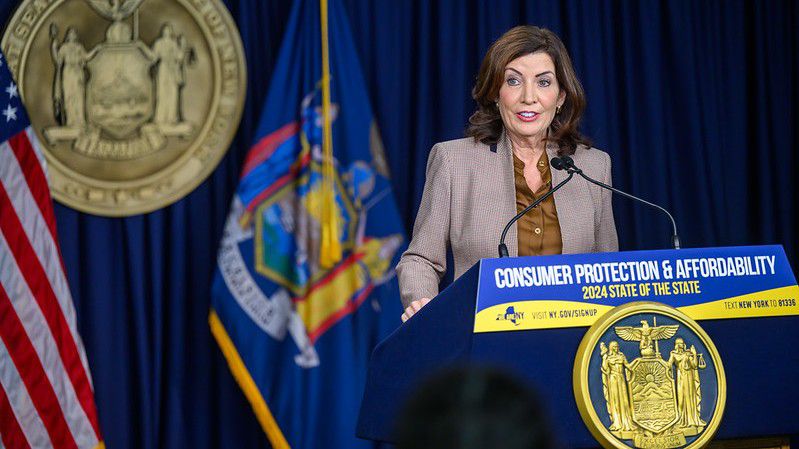Gov. Kathy Hochul on Tuesday gave New Yorkers an early preview of plans she'll unveil in more detail in next week's State of the State address aimed to expand consumer protections, increase paid medical and disability leave and other proposals to make the state more affordable.
The governor wants to change the state's consumer protection law for the first time in 34 years to protect against abusive business practices, she said during a speech in her Manhattan office. It will embolden the state attorney general office's authority to enforce consumer protections and punish predatory debt collectors and operators.
"This is a plan — and this is not everything today — but it is a plan to just really improve the quality of life for New Yorkers and make the state fairer and just more affordable," Hochul said, adding she does not want her smaller proposals to get swallowed up in next week's longer narrative. "...It'll help deter the bad actors from using these practices that hve cheated New Yorkers out of their hard-earned money and make sure it stays in their pockets."
The governor plans to eliminate co-pays for insulin — something she estimates will save $14 million in 2025.
She also wants to increase the maximum benefit for paid medical and disability leave over the next five years and tie it to the Statewide Average Weekly Wage.
"The maximum benefit for paid medical and disability leave has been capped at $170 a week for 35 years; that defies comprehension," Hochul said.
The governor wants the benefit to match the state's paid family leave benefit, or give eligible employees 67% of their average weekly wage — something lawmakers have said they would prioritize this session.
She also will introduce legislation to limit hospitals' ability to sue patients who earn less than 400% of the federal poverty level, or $120,000 annually for a family of four, to protect low-income New Yorkers from medical debt lawsuits.
Hochul will propose legislation to require Buy Now Pay Later companies — or loan providers that allow consumers to pay for purchases in installments — get a license to legally operate in New York and mandate disclosure requirements, impose late fee limits, avenues to dispute resolution and credit reporting standards, improved consumer data privacy and more.
New York is one of eight U.S. states that does not provide protections against unfair or abusive business practices, Attorney General Letitia James said.
"In my office... while we have been successful in stopping the most egregious and bad actors, there is still more that we can do to protect consumers and small businesses from harmful practices," James said. "...I hate that New York, unfortunately, is behind the ball. With this legislation, we will protect businesses, even where the businesses engage in harmful conduct that doesn't involve any type of representation."
Hochul said her focus on better consumer protections comes as high inflation has made it difficult for New Yorkers to afford basic utilities, gas, groceries and other necessities and has likely contributed to the trend of people moving out of the state.
The minimum wage increased statewide Jan. 1, going to $16 an hour in New York City, Long Island and Westchester County and from $14.20 to $15 across the rest of the state. It will continue to increase each year through 2027 when New York's minimum wage will be tied to inflation.
Hochul is slated to deliver her third State of the State address at 1 p.m. Jan. 9 in the Assembly chamber in Albany.



